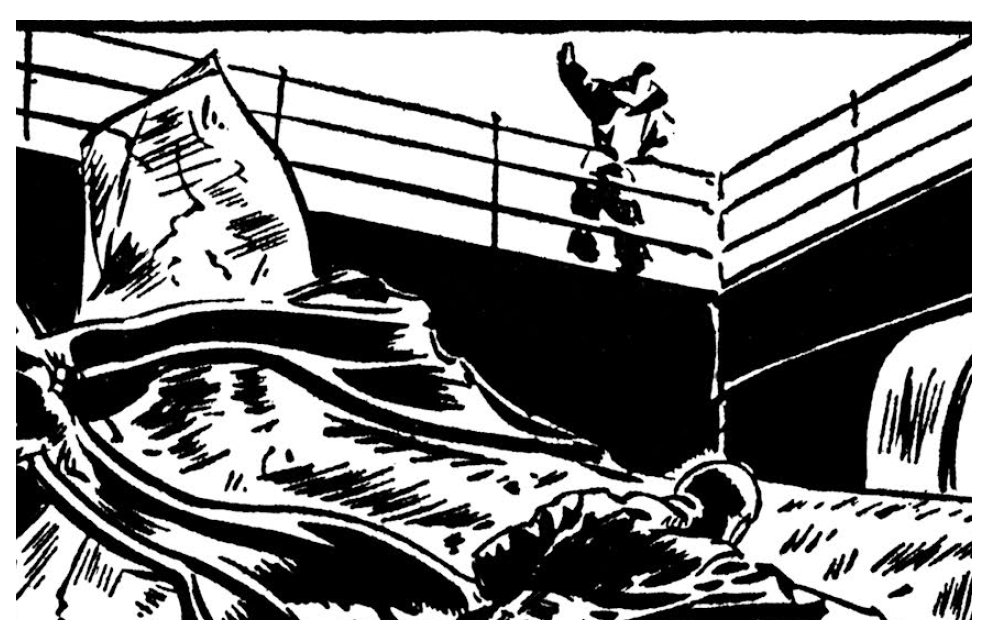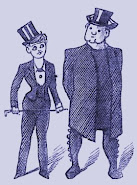“There are strange things done in the midnight
sun” — Cremation of Sam McGee, by Robert W. Service, 19o7
“Many of my sketches were painted after ten P.M., some of them at midnight
while the sun was skipping along the horizon till it finally bounced back up.
It seemed strange after the sun had passed its full day of shining to see it
sink in the northwest and then rise in a few minutes. I saw it but I didn't
believe it. The skies I found very fascinating and often quite queer – that is,
they would be if seen over a pastoral landscape – but naturally perfect in the
settings where sketched.” — Franz Johnston, quoted in Canada Moves North by
Richard Finnie, 1942
by John Adcock
 |
| [2] “The Devil Ship” – Nelvana of the Northern Lights |
NOT surprising. Since Canadian comic talent was drawn from newspaper
staff, high school kids, art school students, sign painters, failed fine
artists and a lumberjack or two, Canadian comic books consisted of 90% filler
pages and 10% semiprofessional material. Despite the wretched and amateurish color printing (which is part of the charm of Golden Age comic books) these comics had a captive audience when American comics were
restricted at the border. For the most part the generation that bought them
fresh off the newsstands did not remember them fondly – most I have talked to
were relieved to return to superior American product.
 |
| [3] Triumph-Adventure Comics, No. 1, August 1941 |
DUE to the use of heavy blacks and the over-reliance on a
paint-brush inking style Adrian Dingle’s artwork somewhat resembled that of Milton Caniff. His inking was most impressive in the early issues which took place under mystical northern lights. The sky shimmers and shakes
and everything is wet and glistening. The stories are typical of the Golden Age
and its stereotypical heroes and villains. Story and art are above average for Golden Age comics.
“Many, many years ago – as legend has it – KOLIAK the Mighty King of the Northern Lights married a mortal. This so angered the gods that a curse was placed upon Koliak forbidding him to be seen again by earthly beings. His spirit may still be seen in the form of brilliant lights that streak majestically across the northern skies. His beautiful daughter NELVANA inherits her mother’s earthly characteristics and is often seen by human eyes. Her brother TANERO carries the curse of his father and so must never be seen by those of the white race.” – introductory blurb to Nelvana of the Northern Lights
“Many, many years ago – as legend has it – KOLIAK the Mighty King of the Northern Lights married a mortal. This so angered the gods that a curse was placed upon Koliak forbidding him to be seen again by earthly beings. His spirit may still be seen in the form of brilliant lights that streak majestically across the northern skies. His beautiful daughter NELVANA inherits her mother’s earthly characteristics and is often seen by human eyes. Her brother TANERO carries the curse of his father and so must never be seen by those of the white race.” – introductory blurb to Nelvana of the Northern Lights
CANADIAN WARTIME comics, which survived in such small quantity, have been
highly sought after by collectors at home and abroad. The real value of this
nostalgic collection is the rediscovery and reintroduction of Canadian heroes,
by Canadian creators, to a new audience. Comic book fans (and Canadian
cartoonists) have proudly and enthusiastically embraced Nelvana of the Northern
Lights and further collections are planned.
 |
| [4] “The Devil Ship” |
Canadian Patent Office Records for June 24, 1941, credit Nelvana of the
Northern Lights to Franz Johnston, Paul Johnston and Adrian Dingle. Franz
(originally Francis) Hans Johnston (1888-1949) and Adrian Dingle co-wrote the first story in the
first issue of Triumph-Adventure; and the cartoonist Adrian Dingle took over all writing with the second issue.
Nelvana made her entrance as one of many features in the first monthly issue of Triumph-Adventure
Comics, published by Hillborough Studios in Toronto, Ontario in August
1941. Hillborough’s founders were Adrian Dingle and brothers René and André
Kulbach. The editor was Henry Helier Hamon. (A curious echo of that name can be
found in Harry J. Halperin who edited the comic books Canadian Heroes and
Famous Adventure Stories for Educational Projects Inc. of Montreal in 1942 and
1943.)
AFTER the seventh issue of Triumph Comics, as it was titled from issue No. 5,
it was published by Commercial Signs of Canada/Bell Features from 1942 until 1946.
Six adventures were printed in Bell’s single issue Nelvana of the Northern
Lights in 1945. One story was published in Super Duper Comics, published by F.E. Howard in 1947.
 |
| [5] Trappers by Franz Johnston |
Hope Nicholson, one of the two comic fans
responsible for this Nelvana collection (the other is
Rachel Richey), discovered that Nelvana was based not on legend, but on a real
person, an Inuit woman Franz Johnston met in the Coppermine community in the
Northwest Territories in 1939 (read her account, The Real Nelvana, HERE). Johnston may
have sketched the real-life Nelvana; perhaps she was the “Eskimo madonna” in
the Johnston quote below.
“The majority of my studies
were landscape, this being necessary because figure subjects later developed
into serious paintings must have convincing settings. I painted trees, rock,
snow, ice, freezing, melting, dogs, carioles, sleds, komatiks, igloos, Indians,
Eskimos, buildings, trappers, the doctor and his dogs, Indian madonnas and
Eskimo madonnas, wild flowers, canoes, etc. – countless subjects, all of which
will constitute an authentic record of the country.” — Canada Moves North by Richard Finnie, 1942
Nicholson and Richey gained the rights to Nelvana in 2013 and formed CGA
Comics to introduce the obscure character to a new audience. The result was
this great hardcover volume of Nelvana of the Northern Lights featuring the
complete collection of Nelvana stories in black & white and four-color. Due
to scarcity, and after a painstaking search for surviving issues, one complete
story had to be captured from microfilm.
 |
| [6] Adrian Dingle panel detail |
Nelvana of the Northern Lights is available in digital or hardcover HERE.
IDW Publishing copies will be available on Amazon in November HERE.
Hope Nicholson’s Brok Windsor project (HERE) has been fully funded and should be available by this time next year. Rachel Richey’s Johnny Canuck (HERE) is ongoing.














No comments:
Post a Comment